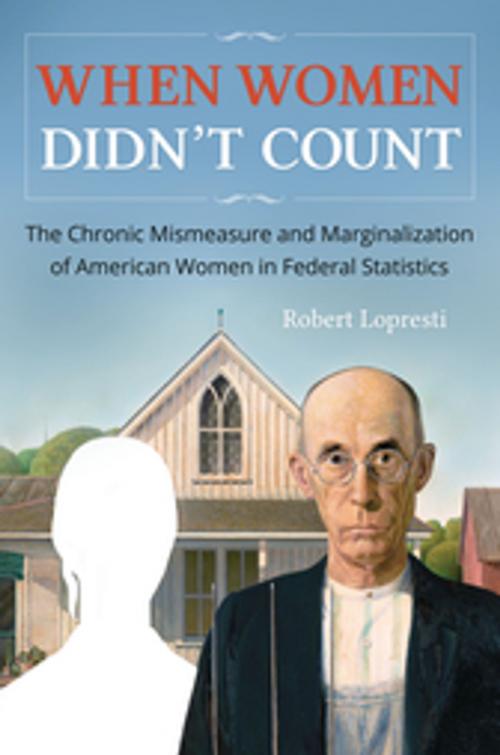When Women Didn't Count: The Chronic Mismeasure and Marginalization of American Women in Federal Statistics
Nonfiction, Social & Cultural Studies, Social Science, Gender Studies, Women&, History| Author: | Robert Lopresti | ISBN: | 9781440843693 |
| Publisher: | ABC-CLIO | Publication: | June 22, 2017 |
| Imprint: | Praeger | Language: | English |
| Author: | Robert Lopresti |
| ISBN: | 9781440843693 |
| Publisher: | ABC-CLIO |
| Publication: | June 22, 2017 |
| Imprint: | Praeger |
| Language: | English |
Much of women's history has been hidden and filtered through unrealistic expectations and assumptions. Because U.S. government data about women's lives and occupations has been significantly inaccurate, these misrepresentations in statistical information have shaped the reality of women's lives. They also affect men and society as a whole: these numbers influence our investments, our property values, our representation in Congress, and even how we see our place in society. This book documents how U.S. federal government statistics have served to reveal and conceal facts about women in the United States. It reaches back to the late 1800s, when the U.S. Census Bureau first listed women's occupations, and forward to the present, when the U.S. government relies on nonprofit groups for statistics on abortion.
Objective and accurate, When Women Didn't Count isn't focused on numbers and census results as much as on recognizing problems in data, exposing the hidden facets of government data, and using critical thinking when considering all seemingly authoritative sources. Readers will contemplate how the government decided that a "farmer's wife" could be a farmer, how the ongoing battle over abortion has been reflected in the numbers the government is allowed to keep and publish, the consequences of the Census Bureau "correcting" reports of women in unusual occupations in 1920, and why the official count of women-owned businesses dropped 20 percent in 1997.
Much of women's history has been hidden and filtered through unrealistic expectations and assumptions. Because U.S. government data about women's lives and occupations has been significantly inaccurate, these misrepresentations in statistical information have shaped the reality of women's lives. They also affect men and society as a whole: these numbers influence our investments, our property values, our representation in Congress, and even how we see our place in society. This book documents how U.S. federal government statistics have served to reveal and conceal facts about women in the United States. It reaches back to the late 1800s, when the U.S. Census Bureau first listed women's occupations, and forward to the present, when the U.S. government relies on nonprofit groups for statistics on abortion.
Objective and accurate, When Women Didn't Count isn't focused on numbers and census results as much as on recognizing problems in data, exposing the hidden facets of government data, and using critical thinking when considering all seemingly authoritative sources. Readers will contemplate how the government decided that a "farmer's wife" could be a farmer, how the ongoing battle over abortion has been reflected in the numbers the government is allowed to keep and publish, the consequences of the Census Bureau "correcting" reports of women in unusual occupations in 1920, and why the official count of women-owned businesses dropped 20 percent in 1997.







![Cover of the book A Student Guide to Health: Understanding the Facts, Trends, and Challenges [5 volumes] by Robert Lopresti](https://www.kuoky.com/images/2012/september/300x300/9780313393068-czBK_300x.jpg)
![Cover of the book The Business of Transportation [2 volumes] by Robert Lopresti](https://www.kuoky.com/images/2014/may/300x300/9780313397363-H1Iy_300x.jpg)
![Cover of the book Women in the American Political System: An Encyclopedia of Women as Voters, Candidates, and Office Holders [2 volumes] by Robert Lopresti](https://www.kuoky.com/images/2018/december/300x300/9781610699747-v4a8_300x.jpg)





